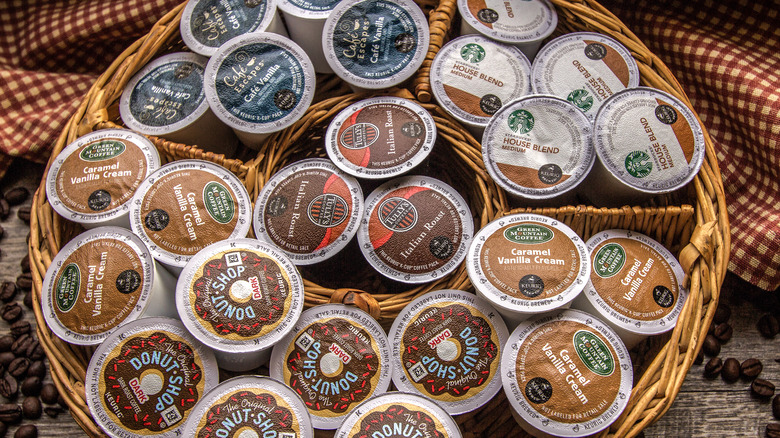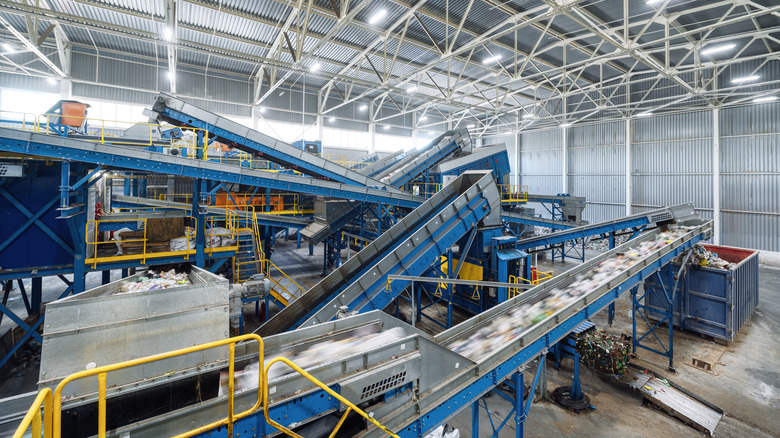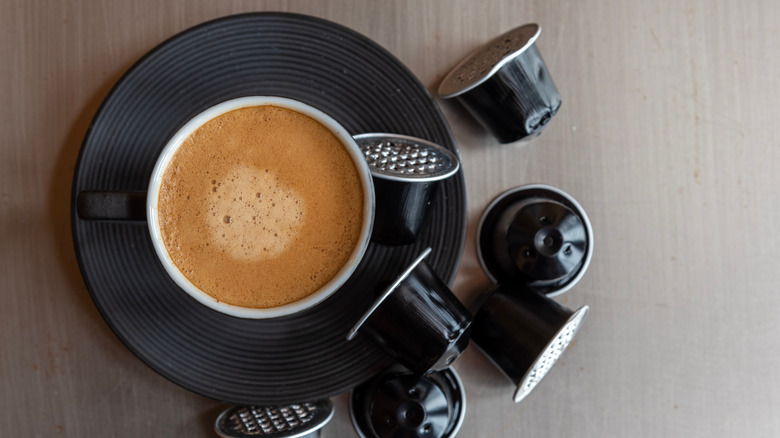Why You Should Stop Using K-Cups Immediately
As working from home has become more common, many people have turned to Keurig's K-Cups when they need their caffeine fix, per Intelligent Blend. After all, K-Cups are cheap, convenient, and remind you of the fancy drinks that you'd splurge on in a café but struggle to make on your own (caramel latte, anyone?). In a world that loves productivity and efficiency, it's practically exhilarating to enjoy a fancy, ready-made, single-serving coffee of your choosing every morning. If you feel like you're stuck in a cycle of constantly working (especially if you rarely leave the house), that morning latte may even feel like a beacon of light.
Unfortunately though, K-Cups are far from the perfect replacement for your favorite café (or budding barista skills). In addition to creating large amounts of unnecessary waste, K-Cups may not be safe — the plastic in the pods may leak hormones, putting you at a greater risk for health issues (via Environmental Health Perspectives).
K-Cups produce waste (and prevent recycling)
When you make a batch of coffee without a single-serving machine — whether you use a drip coffee maker, an espresso machine, or a French press — you're usually only left with biodegradable coffee grounds. Although some coffee makers use disposable paper filters, those are generally biodegradable as well. In contrast, each time you make coffee with a Keurig machine, you're left with a tiny pod that's a pain to responsibly dispose of.
To be fair, Keurig does claim that some of their pods are recyclable. However, according to Treehugger, the cups can only be recycled after each component (plastic shell, aluminum cover, biodegradable coffee grounds) has been separated and washed, a difficult process that undermines the convenience K-cups are supposed to offer. To make matters worse, Keurig's claims that K-Cups are recyclable encourages users to throw their unwashed pods directly into the recycling bin, contaminating other recyclable resources.
Plastic pods may pose health risks
If your mother has ever lectured you about putting hot beverages in a plastic cup, you've probably heard that heated plastics can potentially leach dangerous chemicals into your food (via the Annals of the National Institute of Hygiene). BPA-free plastic is generally considered to be safer (that's why so many plastic water bottles advertise being BPA-free), but unfortunately that isn't necessarily the case.
According to a 2011 study published by Environmental Health Perspectives, almost all types of plastic — including those that we generally consider to be safe — can leak chemicals that act like estrogen. Although estrogen is naturally produced in the body, higher-than-normal levels can lead to fertility issues, obesity, cancer, and other health problems.
Plastics are generally put into seven categories depending on the type of material. For an in-depth breakdown of the categories, check out Earth Easy. At the moment, recyclable K-Cups are made of polypropylene (plastic #5), while non-recyclable K-Cups are simply labelled as plastic #7, a miscellaneous category that covers unknown plastic blends (via Consumer Reports). Though we cannot know the exact effects of non-recyclable K-Cup plastics without testing them, the Annals of the National Institute of Hygiene's study found that polypropylene (like many other plastics) leached significant amounts of estrogen despite being BPA free. Unfortunately, this means that the pods likely leak into your coffee as well.


